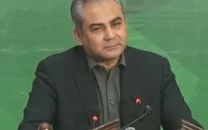Bhutto reference: Does the SC have the power to revisit the judgment, judges ask
Bench, counsel wrestle over semantics of Article 186 of constitution.

Bhutto reference: Does the SC have the power to revisit the judgment, judges ask
The Supreme Court of Pakistan sought on Thursday the record of the reopening of Bhutto’s case, his subsequent arrest and the overnight removal of Chief Justice Yaqoob Ali during the martial law regime, during the hearing on the presidential reference here on Thursday.
Bhutto pleaded before the court to treat him as an ordinary citizen and grant him his fundamental rights and the opportunity to consult his lawyers, contended the federation’s counsel Dr Babar Awan while resuming his arguments before an 11-member bench headed by Chief Justice Iftikhar Muhammad Chaudhry.
The fact that he was not granted due process, previously enshrined in Article 4 of the Constitution, which was later shifted to Article 10-A after the 18th Ammendment, proves the court’s bias against him, he said, contending that several articles of Constitution had been violated during Bhutto’s trial.
“Yes, we know,” remarked the chief justice, adding that the then-chief justice of the Supreme Court was changed overnight. These violations were not only at the level of sessions court but at the Supreme Court as well, he said, remarking that the case was being heard while the Constitution was suspended.
The bench and the federation’s counsel also argued over the scope of the Supreme Court’s power under Article 186 of the Constitution.
“If the counsel wants us to revisit the judgments of Bhutto’s trial in accordance with Article 186, then empower us to do so through legislation,” said Justice Jawad S Khawaja. “The court has only advisory jurisdiction in Article 186. It cannot revisit the judgments,” he added.
Awan asserted that the scope of the Supreme Court’s powers in the Constitution is “wider than that and there is no need for legislation”. Citing previous landmark cases, including the Hasba bill reference, he contended that the court should not be restricted by semantics of Article 186.
“You are asking us not to set aside the judgment, but seeking a revisit of the trial,” remarked the chief justice.
“Before setting aside the judgments, we will have to summon the complainant, Ahmad Raza Kasuri, and provide him a fair hearing,” he said, adding that the constitutional hindrances being faced today “are due to the suspension of the Constitution in the past”.
The court also sought a copy of Justice Shafiur Rehman’s report if the government makes it public in the meanwhile.
The hearing was then adjourned till the third week of June, subject to the bench’s availability.
Published in The Express Tribune, May 13th, 2011.



















COMMENTS
Comments are moderated and generally will be posted if they are on-topic and not abusive.
For more information, please see our Comments FAQ